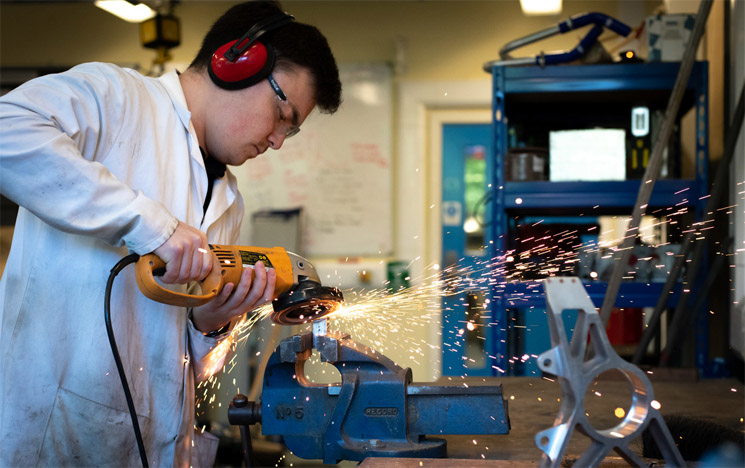Engineering and design
Study at the home of the very first intercontinental computer link at a university ranked joint 160th in the world*. Discover our engineering and design modules below.

Browse our modules
You can see our full list of engineering and design modules below.
Year 1
Year 2
-
Autumn Semester
- Design for Manufacture
- Design for Manufacture for Product Design
- Digital Systems and Microprocessor Design
- Electrical Machines & Power Electronics
- Electronic Circuit & Systems Design
- Engineering Fluid Mechanics
- Engineering Mathematics 2
- Human Factors and Ergonomics
- Interaction Methods
- Principles and Applications of Strength of Materials
-
Spring Semester
- Analogue Communication and Propagation
- Design for Industry
- Electromechanics
- Embedded Systems
- Industrial Automation and Mechatronics
- Integrated Product Design: Research, Theory and Practice
- Numerical Modelling and Engineering Simulations
- Professional and Managerial Skills
- Systems Analysis and Control
- Toy and Game Design
Year 3
Not sure how to choose?
Follow our top tips for choosing your modules. You can also find out about our teaching structure, assessment process and how your credits transfer back to your home institution.
Find out more.
Which school will I study in?
You'll study in the Department of Engineering and Design which is part of the School of Engineering and Informatics.
Our academic staff have expertise in electrical and electronic engineering, automotive and mechanical engineering, robotics engineering and product design.
Our engineering and design research
Staff at Sussex are working on satellite navigation systems and building sonic tractor beams.
Our students are also helping to change things – Lucy Hughes, Product Design graduate, won the UK 2019 James Dyson Award for developing a bioplastic from fish skins that could replace non-biodegradable, single-use plastic.
Our research influences the way we teach, and you learn from academics at the forefront of their fields.
Find out more.
Contact us
If you are studying at Sussex for a semester or year and have questions, email sussexabroad@sussex.ac.uk.
* The Times Higher Education World University Rankings 2021 **Times Higher Education World University Rankings by Subject 2021 **(Our campus is nine minutes by train from Brighton & Hove) survey by accommodation providers Student Living by Sodexo. Rankings based on full undergraduate degree at Sussex.